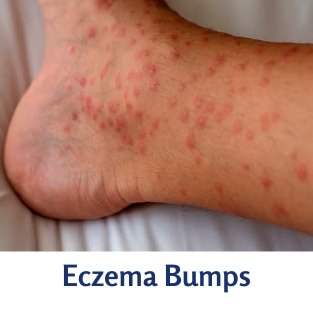10 Essential Tips for Managing Eczema Bumps: A Comprehensive Guide
Eczema, a common skin condition affecting millions worldwide, often manifests as itchy, inflamed patches of skin. One particularly troublesome symptom is the appearance of eczema bumps. These small, raised areas can be uncomfortable, unsightly, and challenging to manage. In this comprehensive guide, we’ll explore ten essential tips to help you understand, treat, and prevent eczema bumps, empowering you to take control of your skin health.
Understanding Eczema Bumps
Before diving into management strategies, it’s crucial to understand what eczema bumps are and why they occur. Eczema bumps, also known as papules, are small, raised areas on the skin that often appear during eczema flare-ups. They can be red, skin-colored, or slightly darker than your natural skin tone. These bumps are typically caused by inflammation in the skin and can be intensely itchy.
Tip 1: Identify Your Triggers
One of the most effective ways to manage eczema bumps is to identify and avoid your specific triggers. Common triggers include:
- Certain fabrics (like wool or synthetic materials)
- Harsh soaps and detergents
- Stress
- Sweating
- Dry skin
- Certain foods
- Environmental factors (like cold weather or low humidity)
Keep a diary to track when your eczema bumps appear and what you were exposed to beforehand. This can help you pinpoint your personal triggers and develop a strategy to avoid them.
Tip 2: Maintain a Consistent Skincare Routine
A gentle, consistent skincare routine is essential for managing eczema bumps. Follow these steps:
- Cleanse: Use a mild, fragrance-free cream that won’t strip your skin of its natural oils.
- Moisturize: Apply a thick, emollient moisturizer immediately after bathing to lock in hydration.
- Protect: Use sunscreen daily, as sun exposure can worsen eczema symptoms.
Choose products specifically formulated for sensitive, eczema-prone skin. Look for ingredients like ceramides, hyaluronic acid, and glycerin, which help maintain skin barrier function and hydration.
Tip 3: Opt for Lukewarm Showers
While a hot shower might feel good in the moment, it can exacerbate eczema bumps by drying out your skin. Instead:
- Use lukewarm water for bathing and hand-washing
- Limit shower or bath time to 10-15 minutes
- Gently pat your skin dry with a soft towel instead of rubbing
- Apply moisturizer within three minutes of bathing to seal in hydration
Tip 4: Use Topical Treatments Wisely
Over-the-counter and prescription topical treatments can be effective in managing eczema bumps. Options include:
- Hydrocortisone creams: These mild steroids can reduce inflammation and itching.
- Calcineurin inhibitors: Medications like tacrolimus and pimecrolimus can help manage eczema without the side effects of steroids.
- Antihistamine creams: These can help relieve itching.
Always use these treatments as directed by your healthcare provider, as overuse can lead to skin thinning and other side effects.
Tip 5: Embrace Natural Remedies
Several natural remedies may help soothe eczema bumps:
- Colloidal oatmeal baths: Oatmeal has anti-inflammatory properties that can calm irritated skin.
- Coconut oil: Its antimicrobial and moisturizing properties can be beneficial for eczema-prone skin.
- Aloe vera: Known for its cooling and soothing effects, aloe vera can provide relief from itching and inflammation.
While these natural options can be helpful, it’s important to patch-test any new product and consult with your dermatologist before incorporating them into your routine.
Tip 6: Manage Stress and Anxiety
Stress is a common trigger for eczema flare-ups, including the development of eczema bumps. Incorporate stress-management techniques into your daily routine:
- Practice mindfulness meditation
- Engage in regular exercise
- Try deep breathing exercises
- Consider cognitive behavioral therapy (CBT) to manage eczema-related stress and anxiety
By reducing stress, you may be able to decrease the frequency and severity of eczema bumps.
Tip 7: Optimize Your Diet
While the link between diet and eczema is still being studied, some people find that certain foods trigger their symptoms. Consider these dietary tips:
- Keep a food diary to identify potential triggers
- Increase intake of anti-inflammatory foods (like fatty fish, leafy greens, and berries)
- Stay hydrated by drinking plenty of water
- Consider probiotic-rich foods to support gut health, which may influence skin health
Remember, dietary changes should be made under the guidance of a healthcare professional to ensure you’re meeting all your nutritional needs.
Tip 8: Choose Eczema-Friendly Clothing
The clothes you wear can have a significant impact on eczema bumps. Follow these guidelines:
- Opt for soft, breathable fabrics like cotton
- Avoid rough materials like wool and synthetic fibers
- Choose loose-fitting clothes to reduce friction
- Wash new clothes before wearing to remove potential irritants
- Use fragrance-free, hypoallergenic laundry detergents
By making these simple changes to your wardrobe, you can significantly reduce skin irritation and the likelihood of developing eczema bumps.
Tip 9: Create an Eczema-Friendly Home Environment
Your home environment plays a crucial role in managing eczema bumps. Consider these tips:
- Use a humidifier to add moisture to the air, especially in dry climates or during winter
- Keep your home cool to reduce sweating, which can irritate eczema-prone skin
- Vacuum and dust regularly to minimize exposure to allergens
- Use hypoallergenic bedding and wash it weekly in hot water
- Avoid harsh cleaning products that may irritate your skin
By creating a skin-friendly home environment, you can reduce the frequency and severity of eczema flare-ups.
Tip 10: Seek Professional Help When Needed
While these tips can be incredibly helpful in managing eczema bumps, it’s important to know when to seek professional help. Consult a dermatologist if:
- Your eczema bumps are severely impacting your quality of life
- Over-the-counter treatments aren’t providing relief
- You suspect your eczema bumps are infected (look for increased redness, warmth, or pus)
- You’re experiencing frequent or severe flare-ups
A dermatologist can provide personalized treatment options, including prescription medications or advanced therapies like phototherapy.
Conclusion
Managing eczema bumps requires patience, consistency, and a multi-faceted approach. By implementing these ten tips – from identifying triggers and maintaining a proper skincare routine to managing stress and creating an eczema-friendly environment – you can significantly improve your skin’s health and reduce the occurrence of eczema bumps.
Remember, everyone’s skin is unique, and what works for one person may not work for another. Be patient with yourself as you find the right combination of strategies for your skin. With persistence and the right approach, you can effectively manage your eczema bumps and enjoy healthier, more comfortable skin.






